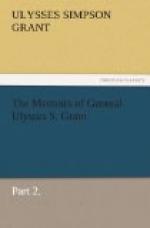While I was stationed on the Pacific coast we were free from Indian wars. There were quite a number of remnants of tribes in the vicinity of Portland in Oregon, and of Fort Vancouver in Washington Territory. They had generally acquired some of the vices of civilization, but none of the virtues, except in individual cases. The Hudson’s Bay Company had held the North-west with their trading posts for many years before the United States was represented on the Pacific coast. They still retained posts along the Columbia River and one at Fort Vancouver, when I was there. Their treatment of the Indians had brought out the better qualities of the savages. Farming had been undertaken by the company to supply the Indians with bread and vegetables; they raised some cattle and horses; and they had now taught the Indians to do the labor of the farm and herd. They always compensated them for their labor, and always gave them goods of uniform quality and at uniform price.
Before the advent of the American, the medium of exchange between the Indian and the white man was pelts. Afterward it was silver coin. If an Indian received in the sale of a horse a fifty dollar gold piece, not an infrequent occurrence, the first thing he did was to exchange it for American half dollars. These he could count. He would then commence his purchases, paying for each article separately, as he got it. He would not trust any one to add up the bill and pay it all at once. At that day fifty dollar gold pieces, not the issue of the government, were common on the Pacific coast. They were called slugs.
The Indians, along the lower Columbia as far as the Cascades and on the lower Willamette, died off very fast during the year I spent in that section; for besides acquiring the vices of the white people they had acquired also their diseases. The measles and the small-pox were both amazingly fatal. In their wild state, before the appearance of the white man among them, the principal complaints they




